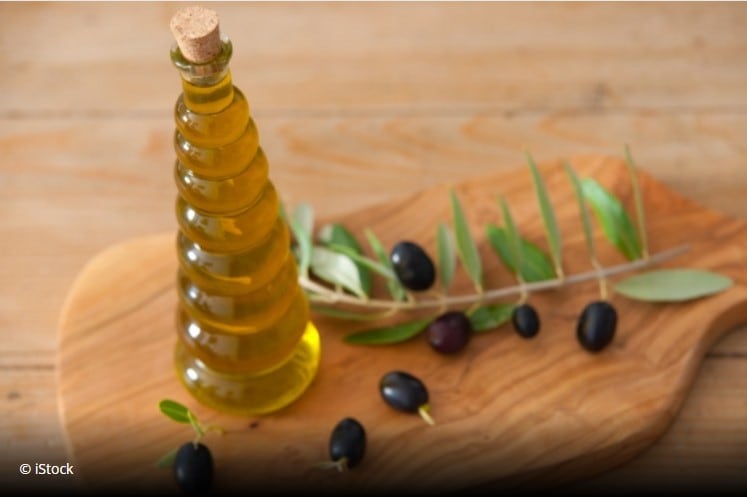“In the current study, we have evaluated the health benefits of wild olive oil (ACE oil) on specific functional and morphological changes involved in hypertension-associated vascular damage,” explained the scientists.
They said their results suggest that daily consumption of ACE oil can counteract harmful effects of arterial hypertension by exerting vasodilator, antihypertensive, antihypertrophic and antifibrotic effects.
“Besides a significant blood pressure-lowering effect, the ACE oil-enriched diet counteracted the alterations found in aortas from hypertensive rats in terms of morphology and responsiveness to vasoactive mediators.
“In addition, a decrease in hypertension-related fibrotic and oxidative stress processes was observed in L-NAME-treated rats subjected to ACE oil supplementation,” wrote the researchers in The British Journal of Nutrition.
Whilst the health benefits of cultivated olive oil are extensively documented, little is known about the olive tree’s wild counterpart, Olea europaea, L. var. sylvertris or Acebuche, an ancient variety that is native to Southern Spain.
Researchers from the University of Seville in Spain therefore designed and led a study aimed at exploring the beneficial effects of wild olive oil (ACE oil) in preventing arterial hypertension associated vascular dysfunction.
Arterial hypertension has long been recognised as one of the most powerful risk factors for cardiovascular events, including myocardial infarction, stroke, heart failure and chronic renal failure.
Rats were divided into four experimental groups of six: rats given free access to water and a standard diet (control group); rats fed a standard diet supplemented with 15% ACE oil (Acebuche group); rats made hypertensive through administration of L-NAME and fed a standard diet (L-NAME group); and rats treated with L-NAME and supplemented with 15% ACE oil (LN+ACE group). All treatments were maintained for 12 weeks.
Blood pressure and cholesterol lowering effect
At the end of the experimental period, as expected, arterial blood pressure was elevated in rats treated with L-NAME alone.
Dietary supplementation with ACE oil decreased both systolic and diastolic blood pressure in hypertensive rats (LN+ACE group), although the values remained higher than those of rats with normal blood pressure.
No differences in total cholesterol, lipid and phospholipid levels in plasma were observed among the different groups.
However, the LN+ACE group exhibited a significant increase in plasma HDL-cholesterol, accompanied by a reduction in LDL-cholesterol and triglycerides.
Interestingly, urea levels (a marker of kidney function) were higher in hypertensive animals but this was counteracted by an ACE oil enriched diet.
“Such an observation supports the notion that renal function might benefit from regular intake of wild olive oil,” suggested the researchers.
Improvements in vascular function
Vascular reactivity experiments showed that an ACE oil enriched diet alleviates vascular dysfunction and improves nitric oxide bioavailability (nitric oxide is a vasodilator molecule in the aorta).
The researchers speculated that the high content of triterpene and secoiridoid polyphenol in ACE oil might account for the improvement in vascular function observed in this study.
Previous studies found a higher amount of tocopherols and sterols in wild olive (ACE) oil compared with standard extra virgin olive oils.
In addition, researchers have reported the presence of a higher proportion of triterpene acids/alcohols and secoiridoid polyphenols in ACE oil than standard olive oils.
To evaluate the effect of ACE oil on blood vessel architecture, morphometric and fibrosis studies were performed in aorta sections from all animal groups. These showed that ACE oil consumption can improve vascular remodelling and reduce aorta fibrosis.
The researchers suggested these effects could be attributable to the high content of oleic acid and triterpene compounds found in this oil.
Antioxidant activity
Supplementation with ACE oil also inhibited the over-production of superoxide anion and the increased NADPH oxidase activity caused by the L-NAME treatment, as well as reversing the significant decrease in antioxidant enzyme activity that was observed in hypertensive animals.
“With the current study we confirm the antioxidant activity of ACE oil in the hypertensive context by inhibiting NADPH oxidase-dependent reactive oxygen species production,” wrote the researchers.
They concluded that regular inclusion of ACE oil in the diet can alleviate vascular remodelling and endothelial dysfunction processes typically found in arterial hypertension, thus resulting in a significant reduction in blood pressure.
Source: The British Journal of Nutrition
Published online: doi.org/10.1017/S0007114522000034
“Daily consumption of wild olive (acebuche) oil reduces blood pressure and ameliorates endothelial dysfunction and vascular remodelling in rats with L-NAME-induced hypertension”
Authors: Reyes-Goya C, Santana-Garrido A, Aguilar-Espejo G, del Carmen Pérez-Camino M, Mate A, Vázquez CM




